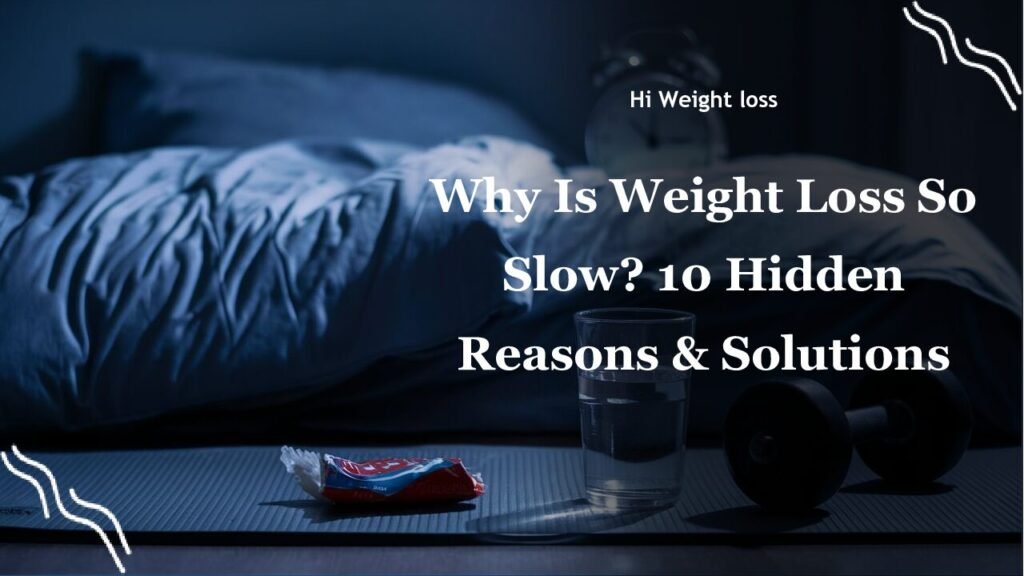“`
Frustrated that the pounds aren’t melting off as quickly as you’d hoped? It’s a common struggle – you’re eating well and maybe even exercising, but the scale stubbornly refuses to budge. It can feel like an uphill battle, especially when you hear success stories of others. This article will dive deep into the often overlooked reasons *why is weight loss so slow*, exploring factors like sleep, stress, diet choices, and even age, so that you can understand what may be holding you back and take the steps to move toward your goals.
Why is Weight Loss So Slow?
The Sleep-Weight Connection: Why Shut-Eye Matters
Ever notice how much harder it is to make healthy choices when you’re tired? That’s because lack of sleep messes with your hormones. When you don’t get enough rest, your body produces more cortisol, the stress hormone, which can actually *fuel weight gain*. It also slows down your metabolism. Most adults should aim for a solid 7-8 hours of sleep each night. Insufficient sleep is a surprisingly common culprit in slow weight loss.
Stress and the Scale: How Anxiety Affects Weight Loss
Stress is another significant factor. You see, similar to sleep deprivation, chronic stress elevates cortisol levels. This not only interferes with your sleep but also can make you feel hungrier, leading to overeating. I remember a particularly stressful period at work where I felt constantly ravenous. It wasn’t a matter of willpower; my body was actually craving more food due to stress. Learning to manage stress through techniques like deep breathing, meditation, or even counseling can be beneficial for weight maintenance and overall well-being. Managing stress is crucial.
The Exercise Trap: Why More Isn’t Always Better
You might think you can “out-exercise” a bad diet, but it’s not that simple. While exercise is great for stress relief and improves sleep quality, it alone isn’t enough to guarantee weight loss. In fact, sometimes over-exercising can lead to increased hunger, and if not balanced with diet, you may end up consuming *more calories* than you burn. It’s about finding the right balance between exercise and dietary adjustments. My friend Sarah was hitting the gym daily but didn’t see results until she started paying attention to her eating habits as well.
Water Works: The Importance of Hydration
Are you drinking enough water? Dehydration can hinder your body’s ability to efficiently burn fat. It’s true! When you don’t have enough fluids, your body slows down. Some signs you may not be properly hydrated are *dark-yellow urine* and constipation. Make sure you are drinking water throughout the day.
Medications and Metabolism: What You Need to Know
Certain medications, such as those for diabetes, high blood pressure, and depression, can sometimes interfere with weight loss. If you suspect that your medications might be slowing down your progress, it’s crucial to have an open conversation with your doctor. They may be able to recommend alternative options or strategies to help you manage your weight effectively. Discuss medications with your physician.
The Tracking Trap: Why Awareness Matters
One common mistake many people make is failing to keep track of what they eat. You might think you’re following a specific diet, but those sneaky high-calorie snacks like chips and trail mix can add up quickly. Dietitians often observe that patients are surprised at the number of calories they consume without realizing it. Keeping a food journal or using a calorie tracking app can make a big difference.
Aging and Metabolism: The Natural Slowdown
As we age, our metabolism naturally slows down. We start to lose muscle mass and gain fat, which can make weight loss a bit more challenging. This is why you might find it harder to lose weight in your 40s or 50s compared to your 20s. It’s not impossible though. Understanding this natural shift is the first step toward making adjustments to your lifestyle.
Strength Training: The Missing Piece of the Puzzle
Many focus solely on cardio for weight loss, but strength training is equally important. Muscle burns more calories than fat, so increasing your muscle mass can significantly boost your metabolism and help you lose weight. If you’re skipping strength training, that could be the reason your weight loss has stalled. Even a couple of short strength training sessions a week can make a huge impact. Strength training sessions can make a difference.
Fad Diets and Quick Fixes: The Pitfalls of Unsustainable Approaches
Fad diets promise rapid weight loss, but they’re rarely sustainable in the long term. These diets can be expensive and often don’t provide you with the necessary nutrients. In fact, many people end up regaining the weight they lost, and sometimes even more. It’s better to focus on making gradual, sustainable changes to your eating habits rather than relying on quick fixes. Fad diets often lead to short-term weight loss.
The Processed Food Problem: Hidden Calories and Lack of Nutrients
Processed foods are often loaded with calories, unhealthy fats, and sugars. They also tend to be low in nutrients, which makes it harder to maintain a healthy weight. Cutting down on processed foods and focusing on whole, unprocessed foods is a smart move when trying to lose weight. Consuming processed foods can hinder weight loss efforts.

Understanding *Why is Weight Loss So Slow For Older Adults*?
For older adults, the reasons for slow weight loss are often more pronounced. As noted before, the slowing of the metabolism is a major factor. It becomes even more crucial to incorporate strength training and focus on a healthy, nutrient-rich diet. It’s also important to be patient and understand that weight loss may not be as rapid as it was when you were younger. Metabolism slows down with age.
Why is weight loss so slow after initial progress?
It’s very common to see fast weight loss in the first few weeks, only to have it slow down considerably after that. This is because at first you are mostly losing water weight. Once your body adjusts to new eating habits, weight loss will become slower and more gradual. Also you need to keep in mind that at first your enthusiasm will be high which can be difficult to maintain over time. Be patient and stick to your plans. And if necessary you can change your plan and try different tactics.
Factors Affecting Slow Weight Loss in Women
Women often face unique challenges when it comes to weight loss. Hormonal fluctuations due to menstrual cycles or menopause can have a significant impact. These hormonal changes can affect metabolism, cravings, and energy levels. Therefore, it’s essential to be mindful of these factors and adjust your strategies as needed. These changes are natural and understanding them will help you stay the course.
Key Factors Contributing to Slow Weight Loss: A Summary
| Factor | Impact on Weight Loss |
|---|---|
| Insufficient Sleep | Slows metabolism, increases cortisol, fuels weight gain. |
| Chronic Stress | Raises cortisol, interferes with sleep, increases hunger. |
| Over-Reliance on Exercise | Can increase hunger, leading to more calorie consumption if not balanced. |
| Dehydration | Impedes fat burning, affects body functions. |
| Certain Medications | Can slow down metabolism or impact weight directly. |
| Poor Dietary Tracking | Leads to consuming more calories than realized. |
| Aging and Metabolism | Metabolism slows with age, making weight loss harder. |
| Inadequate Strength Training | Reduces muscle mass, slows down metabolism. |
| Fad Diets | Unsustainable, can lead to regaining weight. |
| Consuming Processed Foods | High in calories and low in nutrients, hinders weight loss. |
Conclusion
So, *why is weight loss so slow*? As you’ve seen, there are several factors that can contribute to slow or stalled weight loss, many of which are often overlooked. From sleep and stress to medications and diet, understanding these elements is key to making meaningful changes. Remember Sarah, from before, who only saw results once she addressed her eating habits along with her exercise routine. That demonstrates the holistic approach necessary for weight loss. Don’t get discouraged by slow progress, stay consistent, make adjustments when necessary, and seek professional help if you need it. This journey is a marathon, not a sprint. Don’t give up on your health and well-being; there is still a path to reach your goals.
FAQ
Why am I not losing weight even when I’m eating less?
You might be eating less, but are you tracking your calorie intake accurately? There may also be factors like poor sleep or stress that are working against you. Make sure you also check if you are getting enough protein. This helps build muscle mass, which helps burn more calories.
How much strength training should I do to see results?
Aim for at least two to three strength training sessions per week. Focus on compound exercises that work multiple muscle groups at once. You don’t need to be in the gym for hours to see benefits. Start with what feels manageable and increase from there.
Is it normal for weight loss to be slower as you age?
Yes, it is absolutely normal. As you age, your metabolism slows down, which can make it harder to lose weight. Adjust your lifestyle accordingly to account for this. Be patient and consistent and also make sure you talk to your doctor about what might be appropriate.
What are some effective ways to reduce stress and its impact on weight loss?
Techniques like deep breathing, meditation, or yoga can help you manage stress effectively. Engaging in hobbies you enjoy and getting enough sleep can also reduce stress levels. If you find that stress is a consistent problem in your life, it may be beneficial to seek counseling.
How much water should I drink daily to help with weight loss?
Aim to drink at least eight glasses (64 ounces) of water per day. Increase your intake when exercising, or when it is hot. You can also drink more if you have a habit of drinking more and not drinking too little water. Pay attention to your thirst signals, so that you are drinking water accordingly.
“`



